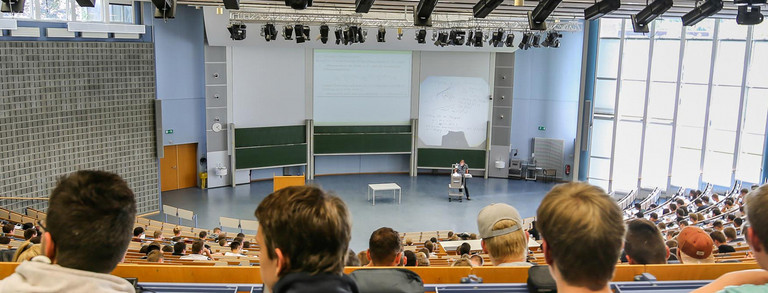Degree Programs from A to Z
The Rehabilitation Sciences degree program is a consecutive Master's degree program and serves to deepen specialist knowledge and scientific working methods for fields of work with rehabilitation pedagogical requirements in an inclusive society.
to the degree program Rehabilitation Sciences (Master of Arts (M.A.))
The Master’s degree program in Religion and Politics enables students to address and understand the relationship between the spheres of religion, society, and politics and the challenges that result from the complex field of tension, and to develop interdisciplinary approaches to solutions.
to the degree program Religion, Ethics, and Politics (Master of Arts (M.A.))
What does my smartphone reveal about me? Who does the new cancer therapy help? Will electric cars help combat climate change? Science, medicine, and technology are becoming increasingly important for our everyday lives - and for politics. Recipients are dependent on competent reporting: Journalists who not only report from the lab and clinic in an exciting manner, but also classify news,
recognize progress and warn against hypes.
to the degree program Science Journalism (Bachelor of Arts (B.A.))
The two-semester Master’s degree program offers a compact course for journalists with leadership ambitions as well as for those who want to delve deeper into research on science journalism. In addition to empirical social research, the program includes editorial management and a leadership seminar. The following subjects are available as a second major: Medical journalism & life sciences, physics, technical journalism and data journalism.
to the degree program Science Journalism (Master of Arts (M.A.))
In addition to providing general sociological skills in the areas of sociological thinking, theories, and social structure, we offer a focus on six key fields of social change (students choose two of them): Social Inequalities and Cultural Differences, Life Course and Biography, Health and Well-Being, Work, Organization and Technology, Knowledge and Education, and Environment and Innovation.
In the Master’s degree Sociology, our department profile "Life in Transformation" is deepened in various areas: What does the future of work look like? Can today’s standard of living and justice for future generations be reconciled (keyword sustainability)? What do mobility patterns look like in different countries and regions, from commuting to migration? What challenges - not only for pensions and care, but also, for example, for housing or education - do aging societies bring with them?
Spatial planning is an interdisciplinary field within the engineering sciences that is concerned with spatial developments in living, working and environmental conditions. The different spatial levels stretch from home environment and neighborhood to suburb, town/city as a whole, surrounding area, regional and national level to European and international level.
to the degree program Spatial Planning (Bachelor of Science (B.Sc.))





![[Translate to English:] Partner Four hands are holding the green logo of TU Dortmund University](/storages/tu_website/_processed_/1/d/csm_Partner_Nicole_Rechmann_KW_670eba0154.jpg)




![[Translate to English:] Forschung An apparatus with tubes in a laboratory](/storages/tu_website/_processed_/0/c/csm_Forschung_Juergen_Huhn_4fa3153b51.jpg)
![[Translate to English:] Studium Five students are sitting in a lecture hall. They are talking to each other.](/storages/tu_website/_processed_/c/9/csm_Studium_FelixSchmale_dbdbfb0dd7.jpg)





